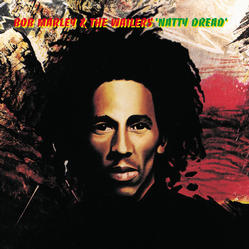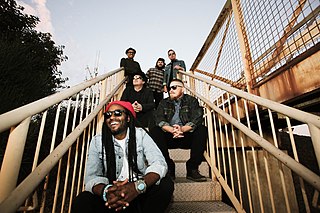
David Nesta "Ziggy" Marley is a Jamaican musician and philanthropist. He is the son of reggae icon Bob Marley and Rita Marley. He led the family band Ziggy Marley and the Melody Makers until 2002, with whom he released eight studio albums. After the disbandment, Ziggy launched a successful solo career by having released eight solo studio albums on his own record company, Tuff Gong Worldwide. Ziggy continues his father’s heritage to record and self-release all of his music. Marley is an eight-time Grammy Award winner and a Daytime Emmy Award recipient.
Dub is a musical style that grew out of reggae in the late 1960s and early 1970s, and is commonly considered a subgenre of it as well as a genre of electronic music, though it has developed to extend beyond the scope of reggae. In the context of reggae, the style consists predominantly of partly or completely instrumental remixes of existing recordings and is achieved by significantly manipulating and reshaping the recordings, usually through the removal of some or all of the vocals, emphasis of the rhythm section, the application of studio effects such as echo and reverb, and the occasional dubbing of vocal or instrumental snippets from the original version or other works.

Natty Dread is the seventh album by Bob Marley and the Wailers, released in 1974. Previously Marley had recorded with Peter Tosh and Bunny Wailer as the Wailers, and this was his first record without them.

Exodus is a 1977 album by Jamaican reggae band Bob Marley and the Wailers, first released in June 1977 through Island Records, following Rastaman Vibration (1976). The album's production has been characterized as laid-back with pulsating bass beats and an emphasis on piano, trumpet and guitar. Unlike previous albums from the band, Exodus thematically moves away from cryptic story-telling; instead it revolves around themes of change, religious politics, and sexuality. The album is split into two halves: the first half revolves around religious politics, while the second half is focused on themes of making love and keeping faith.

Catch a Fire is the fifth studio album by the reggae band Bob Marley and the Wailers, released in April 1973. It was their first album released by Island Records. After finishing a tour in the United Kingdom with Johnny Nash, the band did not have enough money to return to Jamaica; they approached producer Chris Blackwell, who agreed to advance the Wailers money for an album and paid their fares back home, where they recorded Catch a Fire. The album has nine songs, two of which were written and composed by Peter Tosh, the remaining seven were by Bob Marley. After Marley returned with the tapes to London, Blackwell reworked the tracks at Island Studios with contributions by Muscle Shoals session musician Wayne Perkins, who played guitar on three overdubbed tracks. The album had a limited original release under the name The Wailers in a sleeve depicting a Zippo lighter, designed by graphic artists Rod Dyer and Bob Weiner; subsequent releases had an alternative cover designed by John Bonis featuring an Esther Anderson portrait of Marley smoking a "spliff", and used the name Bob Marley and the Wailers.

Alexander Minto Hughes, better known as Judge Dread, was an English reggae and ska musician. He was the first white recording artist to have a reggae hit in Jamaica, and the BBC has banned more of his songs than those of any other recording artist, because of his frequent use of sexual innuendo and double entendres. Following his death, Rolling Stone reported, "He sold several million albums throughout his 25-plus year career and was second only to Bob Marley in U.K. reggae sales during the 1970s".
Steel Pulse are a roots reggae band from the Handsworth area of Birmingham, England. They originally formed at Handsworth Wood Boys School, and were composed of David Hinds, Basil Gabbidon, and Ronald McQueen (bass); along with Basil's brother Colin briefly on drums and Mykaell Riley. Steel Pulse were the first non-Jamaican act to win the Grammy Award for Best Reggae Album.

Bob Marley and the Wailers were a Jamaican reggae band led by Bob Marley. It developed from the ska vocal group, The Teenagers, created by Marley with Peter Tosh, and Bunny Wailer in 1963. By late 1963, singers Junior Braithwaite, Beverley Kelso, and Cherry Smith had joined the group. By the early 1970s, Marley and Bunny Wailer had learned to play some instruments, and brothers Aston "Family Man" Barrett (bass) and Carlton Barrett (drums), had joined the band. The line-up was known variously as: The Teenagers, the Wailing Rudeboys, the Wailing Wailers, then Bob Marley and the Wailers, with three albums between 1971 and 1973 credited to The Wailers. After Bunny Wailer and Peter Tosh left the band in 1974, Marley continued with new band members which included the Barrett brothers, Junior Marvin and Al Anderson on lead guitar, Tyrone Downie and Earl "Wya" Lindo on keyboards, and Alvin "Seeco" Patterson on percussion. The "I Threes", consisting of Judy Mowatt, Marcia Griffiths, and Marley's wife, Rita, provided backing vocals.

Alpharita Constantia Marley is a Cuban-born Jamaican singer and the widow of Bob Marley. She was a member of the vocal group the I Threes, along with Marcia Griffiths and Judy Mowatt, who gained recognition as the backing vocalists for Bob Marley and the Wailers.
Morgan Heritage is a Grammy-winning Jamaican reggae band formed in 1994 by five children of reggae artist Denroy Morgan, namely Peter "Peetah" Morgan, Una Morgan, Roy "Gramps" Morgan, Nakhamyah "Lukes" Morgan, and Memmalatel "Mr. Mojo" Morgan. They have toured internationally and released a number of reggae albums.

Inner Circle, also known as The Inner Circle Band or The Bad Boys of Reggae, are a Jamaican reggae band formed in Kingston in 1968. The band first backed The Chosen Few in the early 1970s before joining with successful solo artist Jacob Miller and releasing a string of records. This era of the band ended with Miller's death in a car crash in 1980.

Robert Nesta Marley was a Jamaican singer, musician, and songwriter. Considered one of the pioneers of reggae, his musical career was marked by fusing elements of reggae, ska, and rocksteady, as well as his distinctive vocal and songwriting style. Marley's contributions to music increased the visibility of Jamaican music worldwide, and made him a global figure in popular culture to this day. Over the course of his career, Marley became known as a Rastafari icon, and he infused his music with a sense of spirituality. He is also considered a global symbol of Jamaican music and culture and identity, and was controversial in his outspoken support for democratic social reforms. In 1976, Marley survived an assassination attempt in his home, which was thought to be politically motivated. He also supported legalization of marijuana, and advocated for Pan-Africanism.

Unchained Spirit is a studio album by the dancehall/reggae artist Buju Banton, released in 2000. It was his first and only album to be released on the ANTI- record label, an imprint of Epitaph Records.

Rebelution is a reggae rock music band formed in Isla Vista, California. The current members of Rebelution are Eric Rachmany, Rory Carey, Marley D. Williams, and Wesley Finley. Each member attended and completed school at the University of California, Santa Barbara.

"How Does It Feel" is song by the British rock band Slade, released in 1975 as the second single from the band's first soundtrack album and fifth studio album Slade in Flame, in promotion of the film of the same name. The song was written by lead vocalist Noddy Holder and bassist Jim Lea, and produced by Chas Chandler. It reached No. 15 in the UK, remaining in the charts for seven weeks.
New Kingston is a Progressive Reggae group whose members combine their Jamaican heritage with the urban sounds of their New York home, New Kingston are a family band consisting of brothers Tahir, Courtney Jr., and Stephen along with their father, Courtney Panton Sr. A first-generation Jamaican-American, Courtney the elder was active in New York's reggae scene before turning his sons on to the music of their island heritage. Born out of jam sessions in the family's Brooklyn basement, the brothers began their career playing Bob Marley and Earth, Wind & Fire covers at parties and gatherings around the neighborhood. By 2010, they'd become focused on their own writing, which fused R&B, hip-hop, and dancehall with traditional reggae sounds. With each brother writing and offering vocals, Courtney Sr. filled in on bass. Following their self-released debut, In the Streets, New Kingston went on a European tour with rising reggae star Collie Buddz, playing a number of prominent festivals. Their sophomore LP, 2013's Kingston University, earned them a deal with New York label Easy Star Records, which issued their third LP, Kingston City, in early 2015. Boasting an increased production value and guest spots by the Tribal Seeds, The Wailing Souls, Sister Carol, and Sugar Minott, Kingston City raised the band's visibility considerably, topping Billboard's reggae chart upon its release. An EP, Kingston Fyah, arrived in the summer of 2016.
Apartheid Is Nazism is an album by the Ivorian musician Alpha Blondy. The title track was a hit; the album, as an import, was a success in the United States prior to its Shanachie release. Blondy supported the album with a North American tour.
The following outline is provided as an overview of and topical guide to Bob Marley:

Arise Roots is an American roots reggae band based out of Los Angeles, California. Their music is described as a "positive classic roots sound with a modern twist".
Make Way for the Indian is an album by the English musician Apache Indian, released in 1995.












